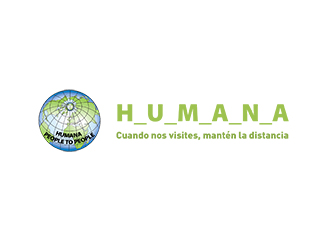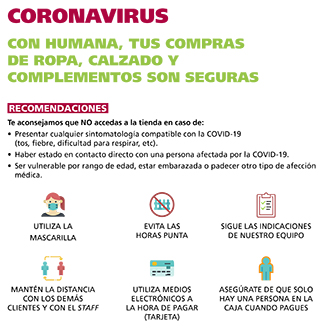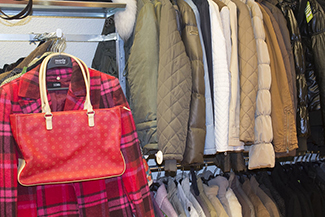consent_cookie
Duración: 1 year
Stores the user's cookie consent state
18-05-2020
The Foundation is preparing to reopen its network of sustainable fashion stores. When designing this reopening program, the recommendations of the health authorities and the guidelines established by the Business Association for Textile, Accessories and Leather Trade (Acotex) are being taken into account.
The Foundation also has the experience and information from the Humana of countries such as Germany and Austria, in which the reactivation of the points of sale has occurred for days. Customer response in these countries is being positive.
Training for teams and provisioning of EPI’s
Humana currently follows a supply program for hydroalcoholic gels, masks, gloves, disinfectant solutions and other protection elements, which will be available at all the points of sale that open their doors. Likewise, online training actions are being carried out with the teams, on action protocols, customer service, constant hygiene measures during the hours of customer service and operations with clothing, footwear and accessories in this new post-stage COVID-19.
A process of selecting the garments with all the sanitary guarantees
According to the New England Journal of Medicine, the lifetime of the virus on textile surfaces is estimated to be a maximum of 48 hours. Keep in mind that at least 10 days have elapsed since the garments are collected in Humana containers, processed in the preparation plants for reuse and sent to the store for sale. The entire process is carried out with extreme prevention measures, while quarantine periods are established between each of the steps in this process of at least 48 hours: garments and footwear are confined in closed bags to avoid the chances of contagion.
Humana staff have received specific information to ensure this entire process. Disinfection and hygiene measures, based on sodium hypochlorite, have been taken in plants, containers and vehicles.
The Federal Institute of Risk Assessment in Germany (BfR), based on the virus's transmission capacity, determines its relative low capacity for environmental stability - that is, it survives by repeatedly changing its environment - making it highly unlikely that Textile or footwear are a source of virus infection. For its part, the Centers for Disease Control and Prevention (CDC) of the United States ensure that the coronavirus is transmitted through the airways (from an infected person who coughs or sneezes), rather than from objects that are contaminated.
The probability of transmission of the virus through used clothing is, in the worst case, minimal and not greater than that of new clothing. As a complementary measure, the Foundation has decided to spray the garments for sale with a hydroalcoholic solution.
Customer experience in Humana stores
The Humana Department of Stores currently values which stores will open and which will not, and the opening hours for the public. The objective is to do so by offering the maximum sanitary guarantees for the team and the public, as well as comfort, ensuring a good experience for the client, in a reliable and friendly environment.
For this, the capacity will be limited, the social distancing within the premises will be promoted, a fluid circulation to avoid crowds, the number of operational testers will be limited, the payment by card will be promoted and the client will be offered all the facilities so that their stay in the store is fully satisfactory.
Garments that customers try on but choose not to buy will temporarily cease to be for sale, as they will be confined in closed bags for 48 hours, before being hanged again and available for purchase.
Customers will always have information on the measures taken through the piped music, the screen located on the back of the box, signage and the staff itself.


